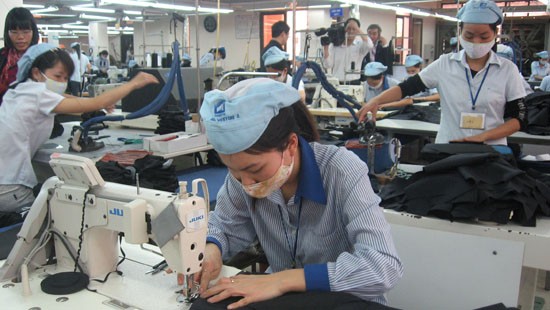(VOVworld) – What are new-generation bilateral free trade agreements? What should be done for domestic enterprises to truly benefit from FTAs? Can Vietnam make the most of preferential tariffs brought about by new-generation FTAs? These are the issues the Vietnamese government, relevant agencies, domestic businesses, and especially overseas representative missions of Vietnam have paid great attention in improving the competitiveness of domestic companies in the new business environment.
 |
| Vietnamese enterprises are ready for new opportunities and challenges brought about by FTAs. (Photo: Fica) |
To date, Vietnam has completed negotiations for 12 bilateral and multilateral free trade agreements, eight of which have become effective and been put into operation.
The new-generation FTAs include the Vietnam-European Free Trade Agreement (Vietnam-EU FTA) and the Trans-Pacific Partnership (TPP) Agreement.
Foreign partners have spoken highly of Vietnam’s efforts to integrate more fully into the global economy.
Danish Ambassador to Vietnam Charlotte Laursen who participated in the negotiations of the Vietnam-EU FTA said: “What has really impressed me is that determination by the Vietnamese government to accomplish or to conclude the very ambitious trade agreement with the EU and with specific nations. And they are very ambitious plan and I think Vietnam would gain much from this or benefit much from this. And I think what is impressive is that the Vietnamese government aware that to benefit from those agreements it will require many reforms at home for Vietnam."
The biggest difference of new-generation FTAs is they will eliminate most tariffs imposed on Vietnamese goods by trading partners, particularly big and important partners like the European Union and the US.
They are expected to create great opportunities for Vietnam to increase its price competitiveness. In comparison with WTO whose members states only commit to reducing but not eliminating tariffs for “some” but not “most” tariffs, new-generation FTAs bring about great preferential tariffs.
But the preferential tariffs also pose a number of challenges. Vietnamese Ambassador to the US Pham Quang Vinh said Vietnam can only optimize preferential tariffs if its export products satisfy conditions in the origin, technical barriers, and hygiene of importing countries.
He added: “Only by improving the competitiveness of our products can Vietnamese businesses avoid high tariff and technical barriers. Our main export items are apparel, leather shoes, and seafood. So if we prepare properly before the TPP comes into force, the Vietnamese economy can become more attractive to foreign investors.”
Technical barriers and strict quarantine systems are the challenges for Vietnamese goods to enter FTA markets.
In addition, since FTAs are reciprocal agreements, Vietnam will no longer enjoy its “home ground” advantages. Local enterprises will have to compete with high quality products and services provided by TPP member countries right at the domestic market.
Nguyen Anh Thu, Vice Rector of the University of Economics and Business under the Vietnam National University Hanoi, said that Vietnam has been taking drastic measures to improve the business environment.
Vietnam should focus more on infrastructure and institution reforms. Moreover, enterprises themselves need to become more proactive and the government need to increase coordination with associations to help businesses better understand the FTAs to take full advantage of opportunities, and overcome challenges posed by the integration process.
Among twelve signatories to the TPP, Vietnam is said to benefit most from the deal with its gross domestic product (GDP) forecast to increase by 23.5 billion USD by 2020 and export value to increase to 68 billion USD by 2025.
Vietnam enjoys a stable political and economic climate, and has abundant natural resources and manpower. With these strengths, new generation FTAs will likely create opportunities for cooperation in capital and more advanced and effective management modes and models for Vietnamese enterprises.
After a decade as a member of the World Trade Organisation (WTO) - a milestone that marks the first investment wave in Vietnam – a series of new-generation FTAs are expected to bring a second wave of investment and motivate institutional and administrative reforms in Vietnam.